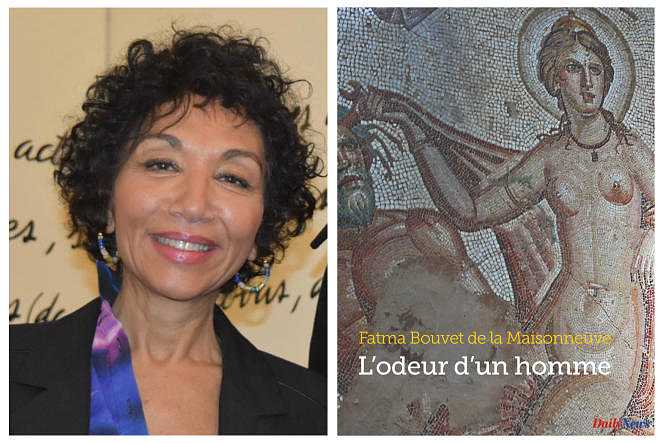Inès' world is divided in two. On the one hand, Switzerland. The huge apartment overlooking Lake Geneva; the perfect family that this Tunisian woman forms with her husband and two children; and, for the winter, the chalet in Verbier facing Mont Blanc, the same group of friends, a bit fabricated but so reassuring. On the other, Béja, in the northwest of Tunisia, where Inès was born and will always be the daughter of the patriarch of the village, even if she has not set foot there for a long time. Of Tunisia, Inès does not know much. The thirty-year-old expatriate cherishes her pale skin, her smooth hair, her lean body, her fine features.
Everything changed on the evening of January 14, 2011, in the Geneva apartment where The Smell of a Man began and ended, the second novel by Franco-Tunisian psychiatrist Fatma Bouvet de la Maisonneuve. Inès and her husband Samy receive the Tunisians of Geneva, "from the artistic-intellectual left to the biggest bosses".
On TV, everyone watches Barack Obama congratulate the Tunisian people for their courage in having ousted dictator Ben Ali from power. Disconnected from the realities of their country, the guests are on fire for the new democracy. Inès said nothing, unable to form a group with her compatriots who, this morning again, despised their country and swore only by the West.
“In reality, Inès finds Tunisians hypocrites, false tokens and rogues, qualifiers that unite them wherever they are. Not to mention their lack of elegance and manners. Besides, they take their ease to such an extent that she feels like a stranger in her own apartment. »
Decipher the world through your sense of smell
Glued to the bay window of her living room, the thirty-year-old observes her reflection and that of "the flashy socialites who reek of lies". They smell like fashionable perfumes – a sickening blend of musk, patchouli, honey and vanilla. If Inès does not speak, she breathes. Fatma Bouvet de la Maisonneuve immediately delights with this heroine who deciphers the world through her sense of smell. This sweetish fragrance of lies soon opposes that of her native village where, eager to see her weakened grandfather again, Inès returns after years, while her country is in the midst of a revolution.
This smell intoxicates her as she drives towards the birthplace, a Bach tune at the top. Rolling down a window, she suddenly receives "a whiff of the smell of thyme, rosemary, verbena, basil, mint and this fertile earth that intoxicates her". Arrived in Béja, the young woman capsizes when she smells a powerful perfume of myrtle. First, she does not recognize the man who carries her in her wake. This is Youssef, her childhood friend, son of the neighbors with whom she shared everything when she was still a skinny girl with curly hair.
We see the work of the psychiatrist in the interactions of her character with her native country. Nothing is left to chance: always there is this mixture of attraction and rejection, contempt and love. Inès may wash her hands, rub her lips and face after the villagers have kissed her, we guess that in Tunisia she has lost control. "The light penetrates Inès through all the pores of her body" when she is in Béja. Youssef, the childhood friend, and the country melt into each other. Slowly, the heroine falls in love with what she left behind.
The intoxication of political combat
There lies the audacity of this novel which tells in the same spirit the revolution of a country and a woman. Because Youssef and his wife are militant on the left, and soon they involve Inès in the organization of the legislative elections. As she discovers the intoxication of political combat, she gets closer to Youssef.
Returning home, falling in love with your childhood friend, then committing to Tunisia's future: can life be that simple? No, of course. Providing a solution to her heroine's torments interests the author less than showing her a path, intimate and political, more sincere and freer.
This is the function of Bulla Regia, which appears recurrently in the novel. This archaeological site in northwest Tunisia, which Inès and Youssef visited as children, recalls the wealth and past grandeur of their country, since it retains traces of the presence of Berbers, Greeks, Phoenicians, Romans and Byzantines. . The site is home to the oldest representation of the marine Venus. Surrounded by fish, it wards off the evil eye. Staring at his face, Inès thinks she hears him say: "I have broken your chains, look at yourself in the mirror that I hold out to you and run after your desire." »












